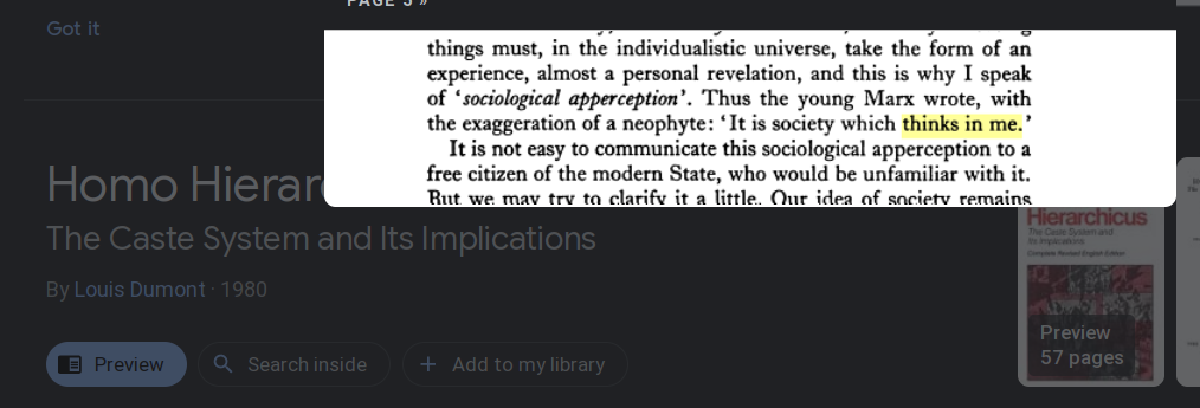The other course I am teaching this term is Introduction to the Study of Religion. We are using Jeffrey Kripal’s excellent textbook, Comparing Religions. Today we were discussing a quote that Kripal attributed to Karl Marx, following Louis Dumont: “It is society that thinks in me.” (Kripal 2014: 209)
We were using the quote to think about how our thoughts and beliefs are largely shaped by the societies and religions we find ourselves in. One student astutely observed that this did not sound like something Marx would say. I agreed that it would be better to have the context for it. We received the quote third-hand, after all. It is best to work with the original primary sources, when they are available.
So I set to tracking down the context for the quote. Running an internet search for the quote turned up no Marx writings. Kripal made the right decision in referencing Louis Dumont as the source where he found this quote. That is the key that I used to solve this little puzzle. I checked Dumont’s 1967 book Homo Hierarchicus, and found that Dumont himself does not cite the source, and rather just nods to it being by a “young Marx.” (Dumont 1967: 5)
The oldest source* that has this quote presents it as an original idea. That is William Ernest Hocking’s 1926 book, Man and the State. (Hocking 1926: 237) Various other books that post-date Dumont’s book repeat it as a quote by Marx. Therefore what I propose happened is that Dumont simply misremembered where he had read the quote. The fact that he failed to check and cite his source resulted in the mistake rippling down the decades to several other scholar’s publications, including our present textbook published in 2014. It is a good reminder to students and scholars alike that citing sources is important.
This is also illustrative for an issue that has been on a lot of minds lately: the rise of so-called artificial intelligence. I would prefer we call it simulated intelligence because at this point at least, it is faking it. So far as I understand it, the GPT language model would be apt to locate the numerous places the above quote is misattributed to Marx, but would have no way of knowing that it is all based on human error.
*Addendum: I have now found that the same idea is expressed in Emile Boutroux’s 1917 article “The Individual Conscience and the Law” published in the International Journal of Ethics: “Is it I who thinks or is it a portion of mankind that thinks in me?” (Boutroux 1917: 321) This is evidently the source that Hocking was reading, though he did not let on that it was not his own idea.
